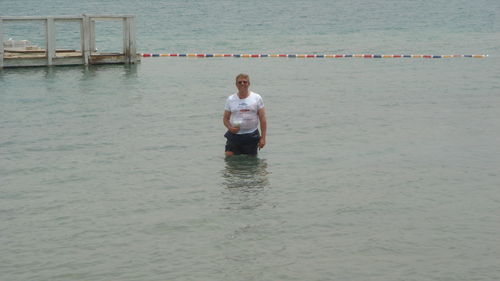So who is that dude in the Dead Sea with the T-shirt that reads Med. Sea (with a blue fish) and below that Red Sea (with a Red fish) and finally below that Dead Sea (with a dead fish)? Yep, that me, last month filming new DVDs. In my life time, the most hyped archaeological discovery has been the finding of the Dead Sea or Qumran scrolls, hands down. There isn’t a close second. This find has produced more books, films, documentaries, doctoral theses, tours, art museum exhibits and the like than are even countable. But why? What’s so important about what happened at the Dead Sea and in the Qumran community in the last two centuries B.C. and the first century A.D.? Inquiring minds need to know. Well, let me first tell you what is not the import of this discover. No New Testament or early Christian documents of any kind have been found at the Dead Sea. The Qumran community, which is probably the same as the ones Josephus calls the Essenes were a sectarian group of Jews with a strong interest in things as varied as eschatology and ritual purification. And in fact the latter was seen as a means of preparing for the former— for the divine intervention of God to judge the world. This is not to say the Qumran community and its scrolls are of little relevance to NT studies. Indeed not. For one thing, some of our earliest copies of any OT manuscript come to us from Qumran– for example the famous Isaiah scroll. For another thing, it is possible John the Baptizer was at one time a member of this community at Qumran. One clue that suggests this is that the verse from Isaiah used in Mark and the Gospels to Introduce John (‘the voice of one crying in the wilderness….’) was in fact what could be called a theme verse at Qumran, and probably helps explain why anyone would move to such a place to prepare for God’s intervention. For another thing, the Qumranites seem to have practiced both ritual purity rites, and also had an entrance water ritual performed one time that could be called baptism. Maybe thazt’s where John got the practice from. Of course when we run into John in the Gospels, he is on his own,. at the Jordan, and gathering his own disciples. The Qumran literature is invaluable because it tells us that there were various early Jews who did expect God’s reign to come on earth before long— John and Jesus were not the first or only people to think this. The other thing is that many of the key theological terms and phrases we find in the NT have an analogue in some of this Qumran literature. In other words the NT partakes of the same Jewish gestalt and interests to some degree. 
More from Beliefnet and our partners

